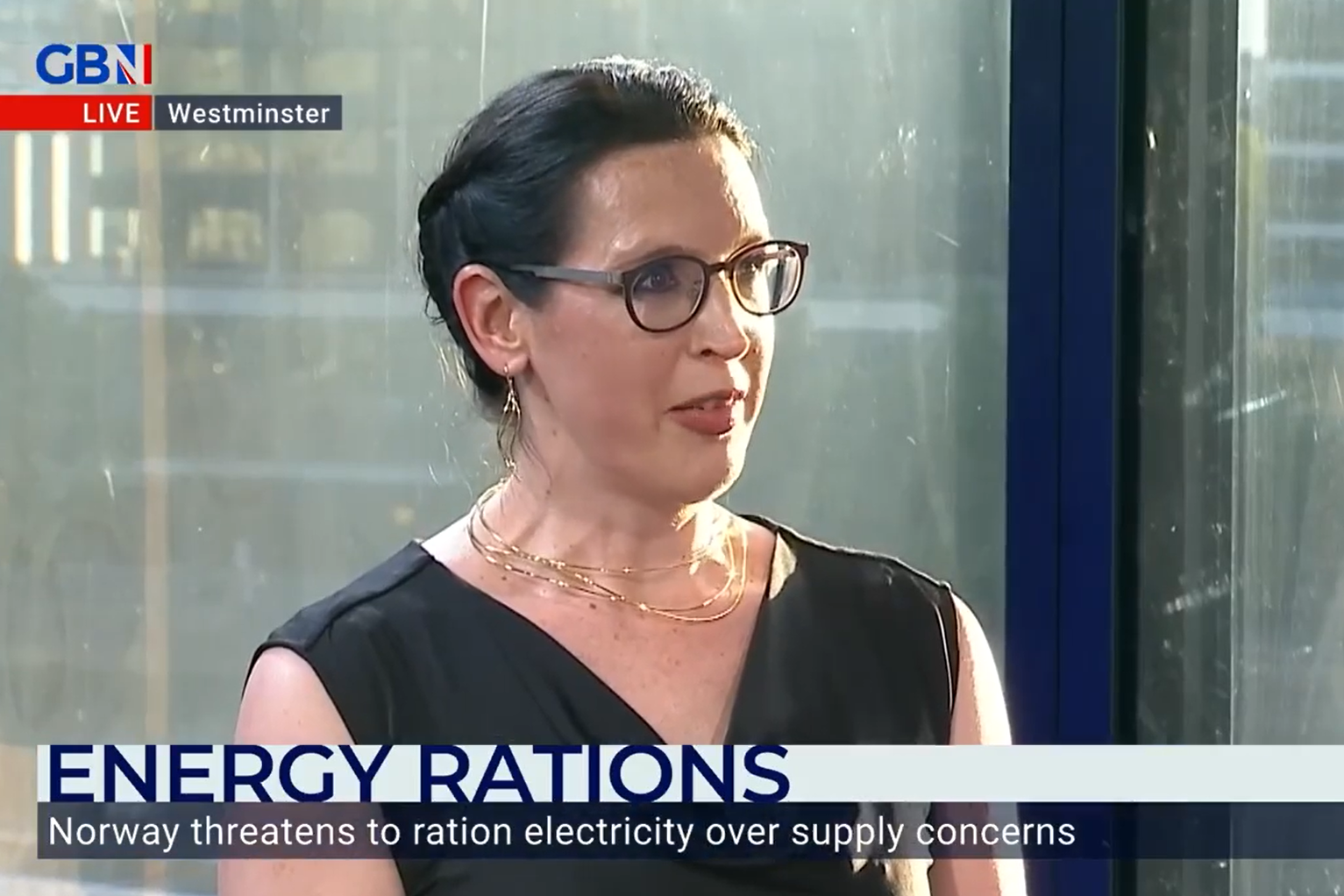The BBC’s flagship current affairs show this week has hosted a climate sceptic with links to the gas sector without declaring the guest’s professional ties, DeSmog can reveal.
Kathryn Porter was introduced as an “energy consultant at Watt-Logic” by business presenter Sean Farrington on BBC Radio 4’s Today programme, which has an audience of around six million, on Monday morning (June 19).
She was invited on the show (1:24) to discuss the National Grid’s ‘demand flexibility service’ scheme, under which households and some businesses receive payments for using less energy at times of peak demand.
The consultant was the sole interviewee in the segment, in which she claimed that the move to renewable energy, primarily wind power, was increasing the risk of blackouts.
But various experts challenge this view and the National Grid, which runs the UK’s electricity network, is not anticipating outages this winter.
Research by DeSmog shows that Porter has a track record of publicly casting doubt on established science on human-caused climate change. She also has a record of being highly critical of renewable energy, which she characterises as “high-cost” and a risk to energy security on the website of her consultancy Watt-Logic.
Porter’s blog repeatedly cites the work of the Global Warming Policy Foundation (GWPF), the UK’s main climate science denial group. She also spoke at a webinar run by GWPF’s campaign arm Net Zero Watch last June.
The BBC regularly covers climate change and the dangers of climate misinformation. Its Director General Tim Davie has said that while the BBC will cover debate on climate policy, human-caused climate change is not “politically controversial” and “the overwhelming consensus is that we, as humanity, are causing global warming”.
Porter states in her Twitter bio that she works with “businesses with projects across the electricity, gas and oil industries”, though these professional links to fossil fuel interests were not identified on the Today programme.
The consultancy website detailing Watt-Logic’s services includes “helping investors and services to develop models for resources including renewable energy generation”, along with advice on asset optimisation, merger and acquisition, financing and risk management for “clients with conventional energy assets including gas-fired power stations, gas storage, upstream oil and gas production and LNG [Liquid Natural Gas]”.
Last month, UK broadcast regulator Ofcom told DeSmog that under its rules “any scientifically unsubstantiated claims must be handled with care and put properly into context – for example, by receiving adequate challenge – to ensure audiences are not misled.”
Richard Wilson from Stop Funding Heat said: “Britain urgently needs a media that tells the truth about climate change. That includes being honest about the affiliations of people who are given a platform, and robustly challenging misleading claims.”
Wind Power ‘Blackout’ Risk
Porter told BBC Radio 4 listeners in the interview: “There were risks around blackouts this winter. Year on year our underlying risk of blackouts is actually increasing, and this is because we’re replacing generation we can control – such as gas, coal, and nuclear power stations – with generation that’s dependent on the weather, primarily wind.” She added: “And so whenever it isn’t windy we’re starting to get into issues of the grid being stressed”.
The claim plays on the idea, often promoted by opponents of climate action, that renewable energy from wind and solar power is unreliable. But the British grid, which ran on 27 percent renewable energy last winter, is performing well compared to others in Europe when it comes to outages, according to a 2022 report from the Council of European Energy Regulators (CEER).
“It is the over-reliance on imported fossil fuels that added to system stress, not the build out of renewable energy,” Jan Rosenow, the director of European programmes at energy NGO the Regulatory Assistance Project and a former adviser to the International Energy Agency, told DeSmog. “Concerns about potential blackouts last winter were linked to the potential supply constraints of fossil gas due to the war on Ukraine by Russia.”
Rosenow pointed out that the overall reliability of power supply has improved in the last decade. He said that in Denmark where, at more than 50 percent, wind and solar contribute twice as much as in the UK to total electricity generation, there were fewer unplanned outages.
Porter went on to say – in a reference to interconnectors, high voltage cables that allow neighbouring countries to trade excess renewable energy – that if countries in Europe pursuing similar strategies to the UK “get the same weather at the same time” there won’t be enough people “exporting to meet demand”.
A National Grid spokesperson told DeSmog: “This past winter interconnectors did what they were designed to do, supporting security of supply for both British and European consumers.”
“We know that renewables are intermittent, which is why we need to find new, more flexible ways to manage the grid”, they added. “Interconnectors are part of the solution, giving system operators the tools to manage rapid changes in supply and demand by enabling access to large volumes of clean electricity at the flick of a switch.”
In a June press release, ESO – Electricity System Operator, a company within the National Grid that moves electricity around the country – said “there was no interruption to customer demand due to unavailable supply on the national electricity transmission system” in winter 2022-23. ESO’s early winter outlook for 2023-24, which calculates the margins between electricity supply and demand, shows “sufficient operational surplus”, and puts the risk of outages “below 0.1 hours”.
The National Grid aims to switch the UK securely and efficiently to a 100 percent low-carbon grid led by wind and solar energy by 2035, and expects to have stints of fully carbon-free UK electricity as early as 2025.
James Murray, Editor at Business Green told DeSmog: “Policymakers and grid operators are well aware of how the grid will have to evolve and the investments that will be required to ensure energy security – and they are making those changes.”
He added: “The suggestion that we can continue to rely on a grid powered by fossil fuels completely underplays the huge climate and energy security risks that come with clinging to 20th century technologies in a fast-changing world.”
Porter’s Energy Blogs
Climate models accurately predict global temperature rises, with observed warming tracking the forecasts.
But in a blog post on her Watt-Logic website in September 2017, Porter wrote that “climate models overstate global warming”, with reference to models used by the UN Intergovernmental Panel on Climate Change (IPCC).
The article quotes extensively from a piece by Paul Homewood, a climate denial blogger who asks: “why should we be expected to have any faith at all in the models?”. Porter’s article references a January 2017 post in which she wrote that “the charge of being unscientific is one which can be legitimately aimed at the IPCC”.
The UK’s independent Climate Change Committee rebutted these arguments in 2013, after they were made by GWPF advisor Matt Ridley.
Baylor Fox-Kemper, Professor of Earth, Environmental, and Planetary Sciences at Brown University, told DeSmog that Porter’s 2017 blog post was a “revival” of old claims about climate models which involve “cherry-picking” the data.
“There are probably hundreds of papers out now debunking the claim that the surface warming hiatus proves climate models are wrong, ” he said. “Kathryn Porter’s 2017 blog confusingly quotes without context reports about how climate models warm in response to carbon dioxide.
“Most importantly, she uses a short-term slowdown in observed warming from 1998 to 2012 to suggest that models always warm too much, a claim debunked by nature (the 2015 to 2016 El Nino ended that slowdown) and by better understanding of how energy rebalances between the subsurface and surface ocean.”
“This year, we’re also seeing extraordinarily high ocean surface temperatures, associated with another developing El Nino and climate change,” he added.
The IPCC has said it is “unequivocal” that human influence has caused “unprecedented” global warming.
But in her September 2017 blog post, Porter also claimed that “the counter-argument to current climate change orthodoxy is that rising levels of atmospheric CO2 are the result of, and not the cause of, rises in global temperature”.
This follows her remark in the January 2017 post that: “it’s curious that the focus has been on CO2 and not on particulate pollution which has far more immediate negative effects on health and the environment”.
In the same post, Porter complained that the way “dissenting voices” on the certainty of human-caused climate change “are dismissed as ‘climate deniers’ sits uneasily as it undermines open debate”.
‘Watt-Logic’ and Energy Supply
Porter describes herself in her Twitter bio and website as an “independent energy consultant helping businesses with projects across the electricity, gas and oil industries”.
In more recent blog posts, Porter has defended fossil fuel companies and criticised renewable energy. In April 2022 she wrote of “the high real cost of renewable generation”, arguing that “renewable electricity is not cheap”. Renewables are the cheapest form of energy generation, according to the UK’s independent Climate Change Committee.
Porter made similar claims in an article published last week, headlined “time to accept that wind farm costs are not falling”, which cites analysis by the climate science-denying GWPF.
In April this year Porter wrote in opposition to the UK’s windfall tax on oil and gas companies, arguing that the “windfall tax harms oil and gas production and must be cut”. In February she defended British electricity and gas supplier Centrica – where she worked as “senior originator” from 2014 to 2016 – against what she called “unfair” criticism over its record profits.
Fossil fuels are responsible for the majority of greenhouse gas emissions warming the planet, according to the IPCC.
Fossil Fuel and Anti-Climate Group Ties
Before setting up her own company, Porter’s website records her work with oil and gas producers in finance roles at Barclays Capital, the energy company EDF, French bank Societe Generale and most recently at British gas parent company Centrica, with “North Sea oil and gas producers and small electricity generators”.
On the Watt-logic website, Porter states: “I help owners of conventional energy assets to optimise their portfolios, carry out due diligence for the sale or acquisition of new assets, and adapt their business models in the face of changing markets.”
Porter has also been associated with political groups leading the charge against climate action. Last June she spoke on a panel about the energy crisis organised by Net Zero Watch (NZW), the campaign arm of the Global Warming Policy Foundation, the UK’s main climate science denial group.
NZW has urged the government to “recommit to fossil fuels” with “a new fleet of coal-fired power stations”, and has called for wind and solar power to be “wound down completely”. Porter cited NZW director Andrew Montford in a blog post last week titled “wind farm costs are not falling”. Another of her sources, Paul Homewood, has written for the GWPF.
In a June 2017 blog post, arguing that then President Donald Trump’s withdrawal from the Paris Agreement was “not a disaster”, she cited Nigel Lawson, the founder of the GWPF, on how “governments and policymakers have been intimidated by a highly vocal environmental lobby into pursuing these expensive and often unsuccessful de-carbonisation policies”.
In September, Porter spoke at an event on the UK energy system run by the Institute of Economic Affairs (IEA), a libertarian think tank which has called for the UK’s net zero target to be scrapped, and which received funding from oil giant BP from 1967 to at least 2018.
Porter declined to comment.
The BBC and the Today programme did not respond when contacted for comment.
Subscribe to our newsletter
Stay up to date with DeSmog news and alerts






